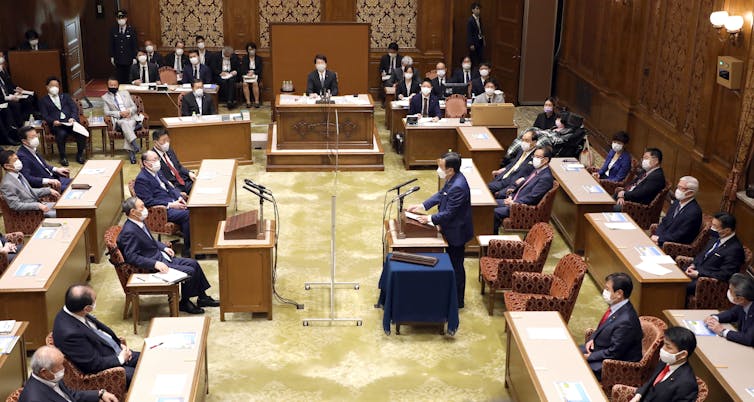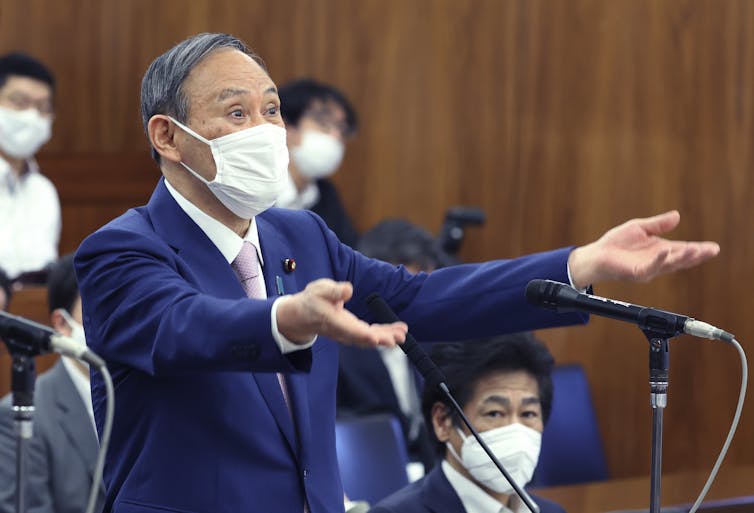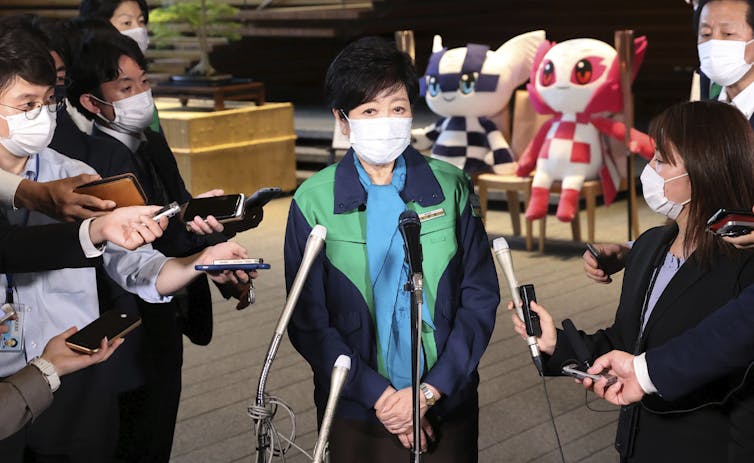Under pressure on the Olympics, Japan's prime minister is saying little and hoping for a political lifesaver
- Written by Donna Weeks, Professor of Political Science, Musashino University
Japanese Prime Minister Yoshihide Suga is probably a little relieved the G7 Summit came when it did.
Before departing for the UK at the end of last week, Suga had been subjected to three days of intense scrutiny in the Diet, Japan’s parliament, over the Tokyo Olympics and the country’s slow rollout of the COVID-19 vaccine.
When an opposition lawmaker pointed out that Suga was being singled out for criticism over the Olympics instead of Tokyo’s governor, the prime minister replied[1],
I’m very glad you said what I want to say. […] I am not trying to run away from [responsibilities], but I feel it is regrettable that this is the direction of the debate in parliament.
 Suga (second from left) answering questions about the government’s COVID response in the Diet last week.
Ryohei Moriya/AP
Suga (second from left) answering questions about the government’s COVID response in the Diet last week.
Ryohei Moriya/AP
Suga’s political fortunes are increasingly tied to the success of the Tokyo games, which are scheduled to begin in just over a month. As the country grapples with a fourth wave of COVID infections, the pressure is building on the government from all quarters.
The public’s support for Suga’s government is hovering[2] in the low- to mid-30% range, while medical professionals are warning the games could lead to the emergence of a new “Olympic” variant[3] of the coronavirus.
Read more: Olympic athletes speak up: current COVID plans aren't enough to keep them safe[4]
Proposed public viewing areas for Olympic events around the country are gradually being withdrawn as local authorities fear the spread of the virus. Notable figures selected to run in the torch relay are pulling out, citing “timetable clashes”. Some 10,000 volunteers have withdrawn from the games, as well.
To make matters worse, Kaori Yamaguchi, a Japanese Olympic Committee member and former judo medallist, said Tokyo had been “cornered[5]” into hosting the games in a scathing opinion piece:
We are damned if we do, and damned if we do not. […] What will these Olympics be for, and for whom? The games have already lost meaning and are being held just for the sake of them.
Suga’s long game
All of this would appear to be very bad for Suga’s government. In the Diet last week, Suga took what many perceived to be a non-committal approach, failing to clearly answer questions[6] put to him over the games.
He insisted he is responsible for ensuring the health and safety of the Japanese people, but didn’t offer specifics beyond this. He waxed lyrical about his memories of the 1964 Tokyo Olympics and his hope that everyone can experience the excitement of that time.
He did manage to announce, to the surprise of most observers, that the vaccination rollout is picking up and should be completed by November[7]. Japan has administered 20 million vaccine doses so far, but just 4% of the population is fully vaccinated[8].
Read more: Can the Olympics still be cancelled? Yes, but the legal and financial fallout would be staggering[9]
By focusing his attention on the pandemic and offering vague responses on the Olympics, one could speculate Suga is playing the long game.
Elections are expected this year both nationally and for the Tokyo municipal government. Suga may be hedging on the Olympics. If the games are successful, this will work in his electoral favour, but if there are problems, he can claim the games were outside his purview.
Suga and his government do have some room for optimism, too. Though his public support has plummeted from around 70%[10] last year, voters may be reluctant to transfer their support to what many see as a lacklustre opposition.
And though there is still much public opposition to the games going ahead, it is becoming clearer to people that the decision lies with the International Olympic Committee, not with government officials at the national and local level.
 Suga’s term as PM ends September 30 and he must call a national election before October 21.
Masanori Genko/AP
Suga’s term as PM ends September 30 and he must call a national election before October 21.
Masanori Genko/AP
The fortunes of Koike and (possibly) Abe?
Interestingly, the three politicians with direct political carriage of the Olympics are women: Tokyo Governor Yuriko Koike; Hashimoto Seiko, the recently installed president of the Japanese Olympic Committee; and Marukawa Tamayo, the minister responsible for the Olympics.
Koike was comfortably re-elected last year and has been consistent in her push to apply tight restrictions to combat the pandemic. She fronts the media on an almost daily basis appealing to Tokyoites to “stay home” and observe all the necessary protocols to prevent the spread of the virus.
She has also garnered some support from her prefectural colleagues in a team effort to force the hand of the national government to implement stricter controls. As a result, her popularity has remained relatively high, with 57% of respondents in a recent poll[11] approving of her leadership.
 Koike has become one of the most public government faces during the COVID outbreak.
Masanori Genko/AP
Koike has become one of the most public government faces during the COVID outbreak.
Masanori Genko/AP
Koike was formerly a member of Suga’s Liberal Democratic Party prior to taking on Japan’s largest governorship. There has been speculation around whether she will make a return to national politics to realise her own prime ministerial ambitions. A strong show of leadership during this time won’t hurt her ambitions.
The recent machinations of former Prime Minister Shinzo Abe are not to be overlooked, either. When Abe made a surprise appearance at the 2016 Rio Olympics closing ceremony, he no doubt harboured ambitions to see a successful Tokyo Olympics as the swansong of his long time in office.
Abe resigned as prime minister last year due to health reasons, but not, significantly, from parliament. Suga was then elected by his party colleagues to replace Abe as prime minister.
Abe recently made some “observations[12]” regarding Suga’s potential successor, and rumours swirled about a possible (but unlikely) return to the top job. Abe appeared to take himself out of the running, but polls show he still has some public support.
A new opinion poll[13] suggests the Japanese public are reluctantly giving into the inevitable, accepting the games will get underway in just over one month.
With the upcoming elections increasingly being seen as a referendum on the government’s handling of both the Olympics and the vaccine rollout, Suga and his colleagues are probably hoping the same sense of inevitably will get them over the line, as well.
Read more: The Tokyo Olympics are going ahead, but they will be a much compromised and watered-down event[14]
References
- ^ replied (www.reuters.com)
- ^ hovering (www.asahi.com)
- ^ new “Olympic” variant (www.ausdoc.com.au)
- ^ Olympic athletes speak up: current COVID plans aren't enough to keep them safe (theconversation.com)
- ^ cornered (www.news.com.au)
- ^ clearly answer questions (mainichi.jp)
- ^ should be completed by November (www.npr.org)
- ^ fully vaccinated (www.nytimes.com)
- ^ Can the Olympics still be cancelled? Yes, but the legal and financial fallout would be staggering (theconversation.com)
- ^ plummeted from around 70% (abcnews.go.com)
- ^ recent poll (www.pressreader.com)
- ^ observations (asia.nikkei.com)
- ^ new opinion poll (www.scmp.com)
- ^ The Tokyo Olympics are going ahead, but they will be a much compromised and watered-down event (theconversation.com)
















